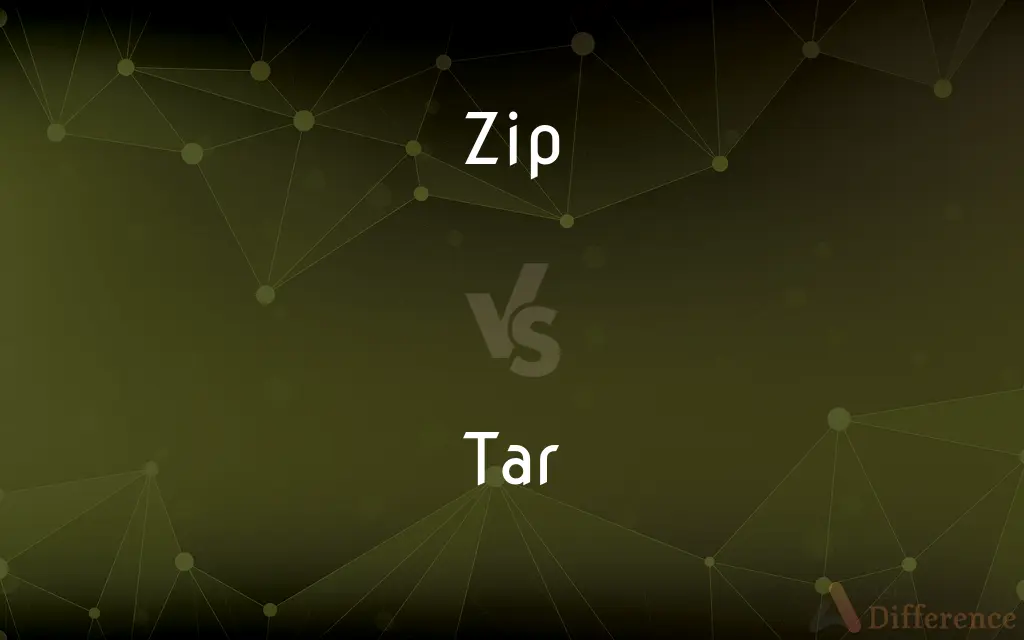ZIP vs. TAR — What's the Difference?
By Fiza Rafique & Maham Liaqat — Updated on April 5, 2024
ZIP is both a file format and compression method, while TAR archives files without compression, preserving file structure.

Difference Between ZIP and TAR
Table of Contents
ADVERTISEMENT
Key Differences
ZIP files not only bundle multiple files into a single file but also compress them, reducing the overall file size. This makes ZIP ideal for saving space and for faster transmission over the internet. TAR, or Tape Archive, on the other hand, bundles files together without compressing them. It's used primarily to consolidate a collection of files into one for easier handling or for preparation for compression with another tool.
ZIP files are widely used across different operating systems and platforms, offering not just compression but also encryption and file integrity checks. This versatility makes ZIP files suitable for a wide range of purposes, including secure file sharing and software distribution. TAR files, while not offering built-in compression, are often used in conjunction with compression tools like gzip or bzip2, resulting in formats like .tar.gz or .tar.bz2, which bundle and compress files.
The ZIP format includes tools for managing archives, such as adding or extracting individual files without decompressing the entire archive. This feature is particularly useful for managing large archives or when only a part of the archive needs to be accessed. TAR, while it bundles files efficiently, typically requires the entire archive to be uncompressed (if it was compressed with another tool) to access individual files, making it less flexible for quick file retrieval.
ZIP's compression algorithm is designed to be fast and efficient, making it suitable for files that need to be compressed and decompressed quickly. TAR's approach to simply archiving files without compression makes it ideal for situations where files need to be archived in their original state or when they will be compressed using a more effective algorithm separately.
Despite their differences, both ZIP and TAR are essential tools in file management and distribution. ZIP’s utility lies in its compression and encryption capabilities, making it suitable for a broad audience, while TAR’s strength is in its simplicity and effectiveness in bundling files together, making it a staple in systems where files are managed in bulk.
ADVERTISEMENT
Comparison Chart
Compression
Yes, compresses files
No, archives files without compression
Usage
Broad, across various OS and platforms
Common in Unix/Linux systems
Features
Encryption, file integrity checks
Often used with separate compression tools
File Management
Manage individual files within the archive
Entire archive management, less flexible
Efficiency
Fast compression and decompression
Ideal for archiving in original state
Common Formats
.zip
.tar, .tar.gz (with gzip), .tar.bz2 (with bzip2)
Compare with Definitions
Zip
Encryption available.
ZIP archives can be encrypted for secure file sharing.
Tar
Used with compression tools.
TAR files are often compressed into .tar.gz using gzip for efficiency.
Zip
Compressed archives.
The document folder was compressed into a ZIP file to reduce its size.
Tar
Unix/Linux preference.
TAR is a standard archiving tool in Unix and Linux systems.
Zip
Multi-platform support.
ZIP files can be created and extracted on Windows, macOS, and Linux.
Tar
Original state preservation.
Using TAR ensures files are archived in their original state for later compression.
Zip
Selective file management.
It’s possible to extract a single file from a ZIP archive without decompressing the entire file.
Tar
Bundled archives.
TAR was used to bundle the project files without compressing them.
Zip
Compression efficiency.
ZIP compression significantly reduces the file size for easier emailing.
Tar
Whole-archive management.
To extract a file from a .tar.gz archive, the entire archive must be decompressed.
Zip
A brief sharp hissing sound.
Tar
Tar is a dark brown or black viscous liquid of hydrocarbons and free carbon, obtained from a wide variety of organic materials through destructive distillation. Tar can be produced from coal, wood, petroleum, or peat.Mineral products resembling tar can be produced from fossil hydrocarbons, such as petroleum.
Zip
Energy; vim
I just don't have any zip today.
Tar
A dark, thick flammable liquid distilled from wood or coal, consisting of a mixture of hydrocarbons, resins, alcohols, and other compounds. It is used in road-making and for coating and preserving timber.
Zip
A zipper.
Tar
A sailor.
Zip
(Slang) Nothing; nil; zero
He knows zip about the restaurant business.
Tar
Cover (something) with tar
A newly tarred road
Zip
To move with a sharp hissing sound.
Tar
A dark, oily, viscous material, consisting mainly of hydrocarbons, produced by the destructive distillation of organic substances such as wood, coal, or peat.
Zip
To move or act with a speed that suggests such a sound
The cars zipped by endlessly.
Tar
See coal tar.
Zip
To act or proceed swiftly and energetically
Zipped through her homework.
Tar
A solid residue of tobacco smoke containing byproducts of combustion.
Zip
To become fastened or unfastened by a zipper
The dress zips up the back.
Tar
A sailor.
Zip
To cause to move with speed and force
Zipped the ball to a teammate.
Tar
To coat with or as if with tar.
Zip
To fasten or unfasten with a zipper
Zipped up his jacket.
Tar
A black, oily, sticky, viscous substance, consisting mainly of hydrocarbons derived from organic materials such as wood, peat, or coal.
Zip
The high-pitched sound of a small object moving rapidly through air.
Tar
Coal tar.
Zip
(informal) Energy; vigor; vim.
Tar
(uncountable) A solid residual byproduct of tobacco smoke.
Zip
A zip fastener.
Tar
A sailor, because of the traditional tarpaulin clothes.
Jack Tar
Zip
(slang) Zero; nothing.
I know zip about economics.
Tar
(uncountable) Black tar, a form of heroin.
Zip
A trip on a zipline.
Tar
(computing) A program for archiving files, common on Unix systems.
Zip
A zip file.
Tar
(computing) A file produced by such a program.
Zip
(programming) convolution
Tar
A Persian long-necked, waisted string instrument, shared by many cultures and countries in the Middle East and the Caucasus.
Zip
(slang) An ounce of marijuana.
Tar
A single-headed round frame drum originating in North Africa and the Middle East.
Zip
(onomatopoeia) Imitative of high-pitched sound of a small object moving rapidly through air.
Tar
(transitive) To coat with tar.
Zip
(transitive) To close with a zip fastener.
Tar
(transitive) To besmirch.
The allegations tarred his name, even though he was found innocent.
Zip
To close as if with a zip fastener.
Zip one's lip
Tar
To create a tar archive.
Zip
To compress (one or more computer files) into a single and often smaller file, especially one in the ZIP format.
Tar
A sailor; a seaman.
Zip
To subject to the convolution mapping function.
Tar
A thick, black, viscous liquid obtained by the distillation of wood, coal, etc., and having a varied composition according to the temperature and material employed in obtaining it.
Zip
To move rapidly (in a specified direction or to a specified place) with a high-pitched sound.
The bullet zipped through the air.
Tar
To smear with tar, or as with tar; as, to tar ropes; to tar cloth.
Zip
To move in haste (in a specified direction or to a specified place).
Zip down to the shops for some milk.
Tar
Any of various dark heavy viscid substances obtained as a residue
Zip
(transitive) To make (something) move quickly
Tar
A man who serves as a sailor
Zip
To travel on a zipline.
Tar
Coat with tar;
Tar the roof
Tar the roads
Zip
A hissing or sibilant sound such as that made by a flying bullet.
Zip
To make, or move with, such a sound.
Zip
A quantity of no importance;
It looked like nothing I had ever seen before
Reduced to nil all the work we had done
We racked up a pathetic goose egg
It was all for naught
I didn't hear zilch about it
Zip
A fastener for locking together two toothed edges by means of a sliding tab
Zip
Close with a zipper;
Zip up your jacket--it's cold
Zip
Move very fast;
The runner zipped past us at breakneck speed
Common Curiosities
What are the common formats resulting from TAR with compression?
.tar.gz when combined with gzip and .tar.bz2 with bzip2.
Why might someone choose to use TAR with gzip instead of ZIP?
For the preference of compression algorithms or for compatibility with Unix/Linux environments.
Why use TAR if it doesn’t compress files?
TAR is ideal for simply bundling files together in their original state, often prior to applying a separate compression.
Can TAR archives be encrypted?
Not directly, but TAR files can be encrypted if compressed with tools like gzip or bzip2 that support encryption.
Which is faster, ZIP or TAR?
ZIP's compression and decompression processes are fast, but TAR's process of bundling without compression is also quick due to the lack of compression.
Is it possible to selectively extract files from a TAR archive?
It’s possible but less convenient, especially if the TAR archive is compressed.
What is the main advantage of ZIP over TAR?
ZIP compresses files, saving space and facilitating faster transfer, and offers encryption.
How do ZIP and TAR handle large archives differently?
ZIP allows for managing individual files within an archive, whereas TAR typically requires managing the entire archive.
Can ZIP files be split into smaller parts?
Yes, ZIP supports splitting large archives into smaller, more manageable files.
What makes ZIP suitable for software distribution?
Its compression, encryption, and widespread compatibility make it ideal for distributing software efficiently and securely.
Are ZIP files universally compatible?
Yes, ZIP files are supported across most operating systems and platforms.
Why is TAR considered less flexible than ZIP for file retrieval?
Because accessing individual files often requires decompressing the entire archive, especially if it’s compressed.
How do the compression algorithms of ZIP and gzip compare?
Both are efficient, but they use different algorithms; choice often depends on specific needs or system compatibility.
How do ZIP and TAR compare in terms of file integrity?
ZIP offers built-in file integrity checks, while TAR relies on the integrity of the file system or additional tools.
What feature of ZIP is particularly beneficial for secure file distribution?
Encryption, which secures files against unauthorized access.
Share Your Discovery

Previous Comparison
Rub vs. Rob
Next Comparison
Create vs. InventAuthor Spotlight
Written by
Fiza RafiqueFiza Rafique is a skilled content writer at AskDifference.com, where she meticulously refines and enhances written pieces. Drawing from her vast editorial expertise, Fiza ensures clarity, accuracy, and precision in every article. Passionate about language, she continually seeks to elevate the quality of content for readers worldwide.
Co-written by
Maham Liaqat















































